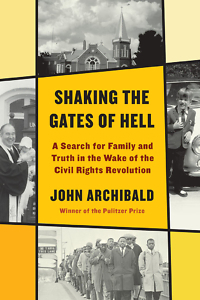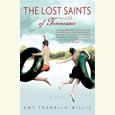Being Good Is Not Enough
Pulitzer Prize-winning columnist John Archibald wrestles with his father’s legacy
In Shaking the Gates of Hell, Pulitzer Prize-winning columnist John Archibald of The Birmingham News struggles, even anguishes, over the legacy of his father, a United Methodist minister.

On a surface level, the book leads the reader to the well-trod conclusion of many a psychotherapy session: Dad wasn’t perfect, but he did the best he could. And that’s OK.
But, as Archibald establishes in authoritative, straightforward prose befitting a writer who has mastered his craft producing three or four columns a week for nearly two decades, the world — and his father — are more complex than that.
Archibald, who won the Pulitzer Prize for commentary in 2018, intimately knows United Methodism. He grew up in the faith and his father and grandfather were Methodist ministers, as were others in his family tree going back generations. He digs into his father’s stances on racism in the 1960s and sexuality questions more recently, and he judges the reverend as coming up short.
“I wish Dad had been more vocal about race in the 1960s,” Archibald writes. “Sometimes a parable is enough. Sometimes the world requires a rhetorical baseball bat.”
A prominent pastor and church official in Alabama, the late Rev. Robert L. Archibald Jr.’s career coincided with the rise of the civil rights movement and continued into the era of the church’s debates about sexuality. (The latter conversation continues today and appears to be leading to the conservative faction leaving and establishing a new denomination.) The sexuality issue vexed John Archibald enough that he announced he was quitting the United Methodist Church in a 2019 column. But in the 1980s, notes Archibald, “nobody said much of anything [about it] from the pulpit.”
“You can hear [the Rev. Archibald’s] sermons from the 1980s and miss many of the steps toward gay and lesbian rights,” he writes. “Perhaps it is there, in places, in allegory and sweeping language about compassion.”
 Although he quotes his father in the book touching on civil rights in sermons as far back as 1964, Archibald again believes it wasn’t enough. The elder Archibald chose to make his points subtly, so as not to risk the reprisals some of his bolder contemporaries suffered. One of his tactics was to preach about “snobbery,” hoping listeners would make the connection to race or sexuality issues.
Although he quotes his father in the book touching on civil rights in sermons as far back as 1964, Archibald again believes it wasn’t enough. The elder Archibald chose to make his points subtly, so as not to risk the reprisals some of his bolder contemporaries suffered. One of his tactics was to preach about “snobbery,” hoping listeners would make the connection to race or sexuality issues.
“If you do a good job, avoid scandal or controversy and don’t make too many waves,” Archibald writes, “you go to larger congregations with nicer parsonages and better pay, like Dad did.”
“I believe Dad feared losing his congregation, that it was better to have subtle influence than outright rejection. … So the … ‘race question’ became a political matter, a secular query to be answered outside the sanctuary that was church, if at all.”
Other ministers of the civil rights era coped with cross burnings, career stagnation, and even violent attacks. Some of those victims were the Rev. Archibald’s friends and colleagues.
Archibald duly notes his father’s many positive attributes, and the reverend’s relationships with family and congregants as described in the book border on saintly. The Rev. Archibald fed down-and-out transients in his home, supported his children when they faltered, and passed along his love of nature to them. The man portrayed in this book would probably have taken the criticism with humility and thanked his son for his insights, were he alive to read it.
“My father was a good man,” John Archibald writes. “But being good is not all it takes. We are remembered, rightly or wrongly, by what we say and do. But we are defined just as much by what we don’t say, what we lack the courage or will to speak out loud.”
If you’ve ever listened to a racist or homophobic joke and not spoken up to disagree, Shaking the Gates of Hell should be compulsory reading. It’s a compelling reminder of the good we could do if we were more courageous.

Jim Patterson is a freelance writer in Nashville. His work appears regularly on the United Methodist News website, UM News. He formerly covered country music for the Associated Press and was a public affairs officer and senior writer at Vanderbilt University.


